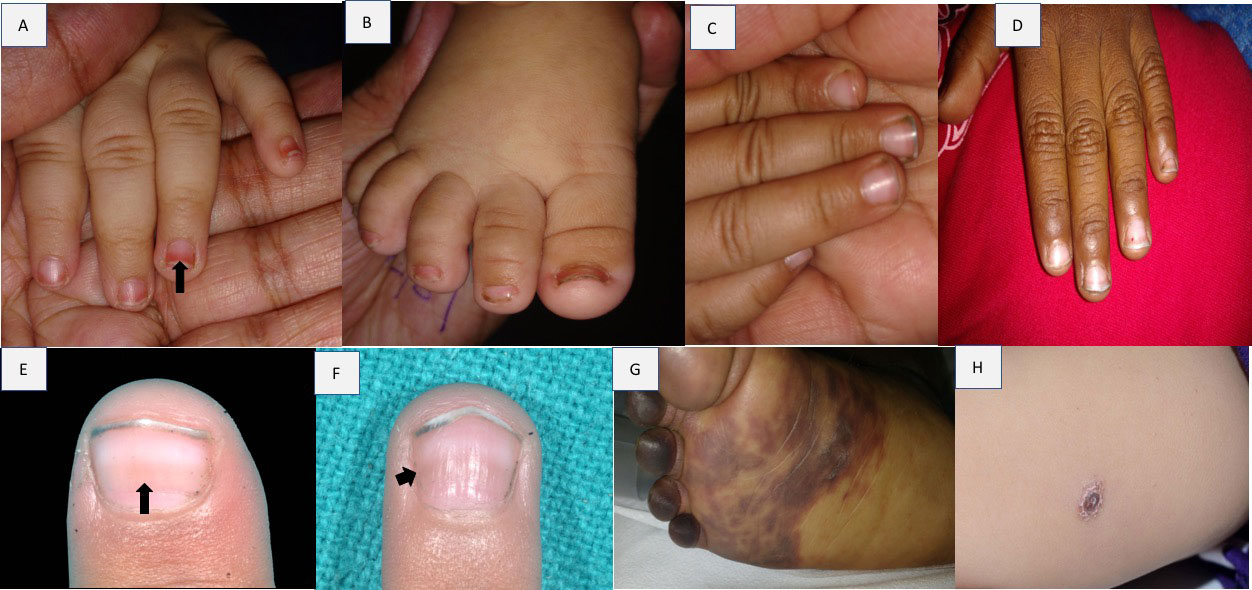Session Information
Date: Monday, November 11, 2019
Title: Pediatric Rheumatology – ePoster II: SLE, Juvenile Dermatomyositis, & Scleroderma
Session Type: Poster Session (Monday)
Session Time: 9:00AM-11:00AM
Background/Purpose: Background: Peripheral signs in Kawasaki disease (KD) include erythematous swelling of hands and feet during acute phase, periungual desquamation and Beau’s lines on nails in convalescent phase. Orange–brown discoloration of nails has, however, not been frequently described in KD.
Methods: Although chromonychia was described by Pal et al way back in 2010, we had not been looking prospectively for this sign until very recently. We report 20 patients with KD and orange-brown chromonychia that were seen during the period May 2017 – February 2019.
Results: Median age at diagnosis in these patients was 1.4 years (range:3 months-4 years). Seven patients were below 1 year. Eleven patients developed chromonychia in acute phase of KD, while in 9 this finding was identified in convalescent phase. Associated atypical features that were seen in these patients included BCG reactivation in 2; macrophage activation syndrome in 2; uveitis in 1; peripheral gangrene in 1; bilateral parotidomegaly in 1; HIN1 pneumonia in 1. Ten (50%) children required second line therapy – infliximab in 6; second dose of IVIg in 1; methylprednisolone in 3. Coronary artery abnormalities were seen in 5 patients and 2 had giant aneurysms – one in left main coronary artery; another in left main, left anterior descending and left circumflex coronary arteries.
Conclusion: Transverse orange brown chromonychia is a useful clinical sign in KD and may be seen in both acute and convalescent phases of the disease. This sign can be easily missed if not looked for carefully. It appears to be more common in infants and young children and may be a marker of more severe disease. Presence of this sign may help pediatricians in arriving at a diagnosis of KD, especially in situations where the presentation is incomplete.
A, B: Shows orange brown transverse lines -chromonychia- on all nails in patient 1
C: Chromonychia in patient 2
D: Chromonychia in patient 3
E, F: Orange brown chromonychia in convalescent phase patient 4
G: Peripheral gangrene in patient 5
F: BCG reactivation in patient 1
To cite this abstract in AMA style:
KUMAR R, Jindal A, Chaudhary H, Singh S. Orange Brown Chromonychia in Kawasaki Disease: A Clinical Sign That Merits Greater Attention [abstract]. Arthritis Rheumatol. 2019; 71 (suppl 10). https://acrabstracts.org/abstract/orange-brown-chromonychia-in-kawasaki-disease-a-clinical-sign-that-merits-greater-attention/. Accessed .« Back to 2019 ACR/ARP Annual Meeting
ACR Meeting Abstracts - https://acrabstracts.org/abstract/orange-brown-chromonychia-in-kawasaki-disease-a-clinical-sign-that-merits-greater-attention/

